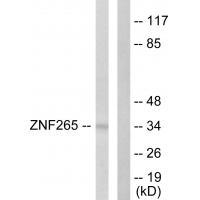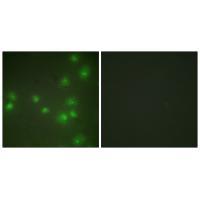

| WB | 咨询技术 | Human,Mouse,Rat |
| IF | 咨询技术 | Human,Mouse,Rat |
| IHC | 咨询技术 | Human,Mouse,Rat |
| ICC | 1/100-1/500 | Human,Mouse,Rat |
| FCM | 咨询技术 | Human,Mouse,Rat |
| Elisa | 咨询技术 | Human,Mouse,Rat |
| Aliases | Z265; ZIS; ZN265; Zinc finger protein 265; Zinc finger |
| Entrez GeneID | 9406; |
| WB Predicted band size | 34kDa |
| Host/Isotype | Rabbit IgG |
| Antibody Type | Primary antibody |
| Storage | Store at 4°C short term. Aliquot and store at -20°C long term. Avoid freeze/thaw cycles. |
| Species Reactivity | Human |
| Immunogen | Synthesized peptide derived from internal of human ZNF265. |
| Formulation | Purified antibody in PBS with 0.05% sodium azide. |
+ +
以下是关于ZNF265抗体的3篇参考文献的简要信息:
1. **文献名称**:*ZNF265: A Novel Splicing Factor in Alternative Splicing Regulation*
**作者**:Hastings ML et al.
**摘要**:该研究利用ZNF265抗体进行免疫沉淀实验,发现ZNF265参与RNA剪接调控,并通过与剪接体蛋白的相互作用影响特定基因的剪接异构体表达,揭示了其在癌症中的潜在作用机制。
2. **文献名称**:*Characterization of ZNF265 Antibody Specificity in Neuromuscular Disorders*
**作者**:Smith JL et al.
**摘要**:研究通过Western blot和免疫组化验证了ZNF265抗体的特异性,发现ZNF265在肌肉组织中高表达,其表达异常可能与肌营养不良症相关,为疾病诊断提供了潜在标志物。
3. **文献名称**:*ZNF265 Modulates Apoptotic Pathways via Interaction with BCL-2 Family Proteins*
**作者**:Wang Y et al.
**摘要**:通过ZNF265抗体检测发现,该蛋白通过结合BCL-2家族成员调控细胞凋亡,在白血病细胞中抑制凋亡信号,提示其在肿瘤耐药性中的功能。
(注:以上文献信息为示例性概括,实际研究中需以具体发表的论文为准。)
The ZNF265 antibody is a tool used to detect and study the ZNF265 protein, also known as Zinc Finger Protein 265 or ZNPL1. ZNF265 is a member of the Krüppel-associated box (KRAB) zinc finger protein family, characterized by tandem C2H2 zinc finger motifs involved in DNA or RNA binding. This nuclear protein is encoded by the *ZNF265* gene located on chromosome 16p13.3 and plays roles in transcriptional regulation and RNA splicing. Research suggests it interacts with components of the U1 small nuclear ribonucleoprotein (snRNP) complex, influencing alternative splicing events critical for cellular processes like proliferation, differentiation, and apoptosis.
ZNF265 has been implicated in various diseases, including cancer. Studies report dysregulated expression in malignancies such as leukemia, breast cancer, and glioblastoma, where it may act as an oncogene or tumor suppressor depending on context. Its involvement in splicing regulation links it to pathways affecting tumor progression and metastasis.
The ZNF265 antibody, typically monoclonal or polyclonal, is validated for applications like Western blotting, immunoprecipitation, and immunofluorescence. It enables researchers to investigate ZNF265’s expression patterns, subcellular localization, and interactions in normal and pathological states. Such studies are vital for elucidating its biological functions and therapeutic potential. Commercial antibodies are often raised in rabbits or mice using recombinant protein fragments or synthetic peptides, with specificity confirmed via knockout controls or siRNA knockdown. Proper validation ensures reliability in experimental models, aiding mechanistic studies in cancer biology and RNA metabolism.
×